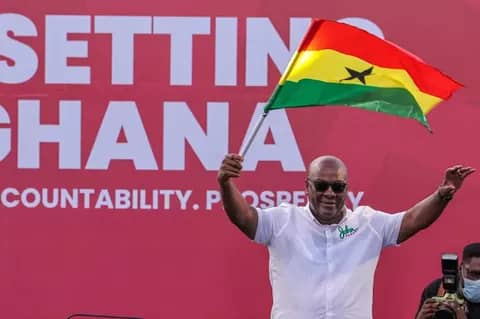On December 5, former Ghanaian President John Mahama stood triumphantly waving the national flag, signaling a significant democratic change in African politics.
Following the country’s peaceful election, Mahama emerged victorious, defeating the establishment candidate and former Vice President, Muhammadu Bawumia.
The Ghanaian elections, held on December 2, 2024, exemplified democratic change in action, setting a new standard for electoral integrity across Africa.
Former Vice President Bawumia graciously conceded defeat and congratulated Mahama before the final results were officially announced. This act of sportsmanship underscores the evolving political maturity within the continent, as more nations embrace democratic principles over divisive politics.
Ghana’s elections reflected a high level of transparency and accountability. Despite initial accusations from civil society organizations and the press about flaws in the electoral process, the Electoral Commission swiftly addressed these concerns. Their prompt action highlighted the sincerity of the electoral management body, which worked tirelessly to maintain public trust. This commitment to fairness bolstered the credibility of the elections and demonstrated the power of a transparent system in fostering democratic change.
Ghana’s example echoes the sentiments expressed by observers and stakeholders who praised the nation’s ability to hold free and fair elections despite internal challenges. By prioritizing integrity in its electoral system, Ghana has cemented its position as a beacon of hope for other African nations striving for democratic reform.
Ghana’s successful election adds to the growing list of African countries that have embraced democratic change in recent years. Alongside Senegal, Mauritius, and Nigeria, Ghana has demonstrated that peaceful transitions of power are possible when democratic institutions are strengthened and respected.
In Senegal, the election of Barthélémy Faye, a former political prisoner, showcased the transformative power of democracy. Faye’s victory was hailed as a triumph of the people over entrenched political systems, signaling a shift toward inclusivity and accountability. Similarly, Mauritius elected Dharam Ghokool as its president on December 6, 2024. Ghokool’s rise to power defied incumbency and underscored the power of popular will in shaping political outcomes.
Nigeria’s 2015 presidential election also stands out as a watershed moment for democratic change in Africa. The historic defeat of incumbent President Goodluck Jonathan by opposition candidate Muhammadu Buhari marked the first time in Nigeria’s history that an incumbent lost a presidential election. Jonathan’s decision to concede defeat even before the final results were announced set a powerful precedent for other leaders. His concession call to Buhari, made at 5:15 PM with only one state’s results pending, demonstrated the importance of prioritizing national unity over personal ambition.
Ghana now joins this distinguished list of nations that have embraced democratic change. Mahama’s return to power, defeating an establishment candidate, is a testament to the resilience of the Ghanaian electorate and their commitment to democratic values
The recent elections in Ghana offer valuable lessons for African countries seeking to strengthen their democratic systems. Key among these is the importance of electoral integrity. By addressing public concerns promptly and transparently, Ghana’s electoral management body ensured that the process remained credible and fair. This approach can serve as a model for other nations grappling with similar challenges.
Another critical lesson is the need for political actors to prioritize national interest over personal ambition. The willingness of candidates to accept election outcomes, as demonstrated by both Bawumia and Mahama, is crucial for sustaining democracy. This level of political maturity fosters stability and paves the way for constructive governance.
Lastly, Ghana’s elections highlight the role of civil society and the media in promoting democratic change. By holding the government accountable and raising awareness about potential issues, these entities play a vital role in safeguarding the democratic process. Their efforts underscore the need for an active and engaged citizenry to ensure that democracy thrives.
Democratic change in Africa is not just about peaceful elections; it represents a broader shift in the political landscape of the continent. Countries like Ghana, Senegal, Mauritius, and Nigeria are proving that democracy can thrive in Africa when institutions are strengthened, and leaders are held accountable. These nations are setting a precedent for others to follow, demonstrating that democratic governance is not only desirable but achievable.
This wave of democratic change has significant implications for the continent’s future. Stronger democracies lead to more stable governments, which in turn attract investment and foster economic growth. They also promote social cohesion by ensuring that all voices are heard and represented. As more African countries embrace these principles, the continent is poised to unlock its full potential and take its rightful place on the global stage
Ghana’s recent elections are a testament to the power of democratic change in shaping a nation’s future. By prioritizing integrity, transparency, and inclusivity, Ghana has set an example that other African countries can emulate. The lessons learned from this election can serve as a blueprint for strengthening democracy across the continent.
As Africa continues to navigate its journey toward democratic governance, the importance of strong institutions, an active civil society, and accountable leadership cannot be overstated. These elements are essential for fostering democratic change and ensuring that the continent’s progress remains sustainable.
The success of Ghana’s elections is a reminder that democracy is a continuous process that requires the active participation of all stakeholders. From the electorate to political leaders and civil society, everyone has a role to play in building a democratic future. As Ghana leads the way, the rest of Africa can take inspiration from its example and work toward a brighter, more democratic tomorrow.
In conclusion, democratic change is not just a theoretical concept; it is a tangible reality that is transforming Africa. Countries like Ghana, Senegal, Mauritius, and Nigeria are at the forefront of this movement, proving that democracy can thrive in the continent. By learning from their experiences and building on their successes, Africa can continue to make strides toward a future defined by democratic governance and sustainable development.







